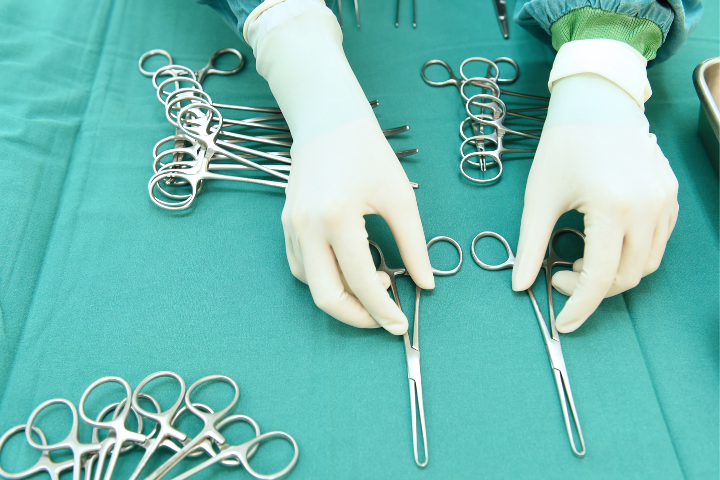What if we told you that with less than a year’s training, you could fast-track a new career path into the thriving healthcare industry? Imagine becoming a highly valued, pivotal member of a high-functioning medical team in less than twelve months. If this sounds appealing, then you should consider signing up for Sterile Processing Technician training.
Becoming a certified Sterile Processing Technician (SPT) can provide you with an opportunity to work in a variety of different workplace environments. Pursuing this avenue into the medical profession sounds great, but what is Sterile Processing Technician training, how do you find a certified training provider, and what does it involve? Here at Dorsey College, we thought we’d tell you about the roles and responsibilities of a Sterile Processing Technician below.
Speak to Dorsey College about our Sterile Processing program today
What is Sterile Processing Technician training?
Sterile Processing Technician training can provide students with a full overview of the requirements and responsibilities needed to become a Sterile Processing Tech. These programs can train students through online and classroom-based learning and often conclude with a supervised clinical experience.
By practicing the necessary skills in a real-time clinical setting, students can recognize the fundamental procedures and practices demanded of the role. These include being able to properly clean, disinfect, and sterilize equipment and instruments and the processes essential to eliminate the spread of infection.
Sterile Processing Technician training can also teach you about workplace safety procedures and quality assurance. Additionally, you can learn crucial medical terminology and the required levels of communication needed when interacting with fellow medical team members.
Upon completing a Sterile Processing Technician program, graduates can take a certification exam.
What skills can you learn in Sterile Processing Technician training?
The key to qualifying successfully to become an SPT is understanding the equipment maintenance and sterilization lifecycle. While Sterile Processing Technicians may work in various medical environments, the fundamental practices are the same; however, the responsibilities may vary.
Preventing the spread of infection is critical in clinical environments, as it protects both staff and patients. Sterile Processing Technician training, particularly clinical experience, provides an excellent opportunity to practice these skills in a real-time clinical environment.
Material you might cover in Sterile Processing Technician courses
Choosing to study with an accredited sterile processing program provides extensive knowledge of the range of attributes needed in the role. As a result, Sterile Processing Technician training covers the different course materials required to become a certified SPT.
Before your clinical internship or experience, sterile processing programs could provide a solid understanding of the following, Medical Terminology, Anatomy and Physiology, Microbiology, Surgical Terminology, Decontamination, Cleaning, Disinfection, and Sterilization.
Understanding these core elements and more ensures that Sterile Processing Technicians can communicate with medical staff team members around them.
Why Sterile Processing Technician programs are important
Sterile Processing Technician training provides SPTs with the critical skills required before entering any medical workplace environment. A sterile processing program is designed to ensure that Sterile Processing Technician graduates are better qualified and more desirable to potential healthcare employers.
With a continually growing population, the healthcare industry will continue to expand. For qualified Sterile Processing Technicians, this creates opportunities in a wide range of medical workplaces.
SPT graduates can select a career path and medical field that suits both their interests and geographical location. For example, experts that specialize in sterilizing equipment are required in a number of medical settings, including:
- State, local, and private hospitals
- Ambulatory services
- Dentist offices and surgical centers
- Physician’s offices
- Laboratories
- Long-term care and retirement facilities
- Plastic surgery clinics
How long does a Sterile Processing Technician program take?
Sterile Processing Technician training can provide students with a short passageway to a new career within the healthcare industry. While course lengths can vary, many offer the opportunity to complete within just 12 months.
Finding a Sterile Processing program that includes a clinical internship or clinical experience is essential. These clinical practice elements are incorporated into the course, providing additional reinforced learning prior to taking their certification exam(s).
Gaining a Sterile Processing Technician certification in Michigan
Michigan does not require state certification to begin a career as a Sterile Processing Technician. If you have obtained a high school diploma or equivalent, enrolling in a Sterile Processing Technician training school prior to attempting the certification exam provides many key advantages.
Holding certification as a Sterile Processing Technician could provide you with an opportunity of being:
- A more desirable hire for prospective employers
- Opportunities to achieve higher entry-level salaries
- Fast-tracked with further education may provide for speedier career progression
Kickstart your new career today!
Because Sterile Processing Technicians play a vital role in most healthcare environments, it’s considered a desirable vocational path into the medical profession. So, if you’re looking for a career change or a more rewarding profession, becoming an SPT will undoubtedly appeal.
Just imagine retraining in less than a year to become a crucial team member in various medical workplace environments. Here at Dorsey College, our Sterile Processing Technician training program has been curated by experts from the healthcare sector. With the Sterile Processing program, you can receive the training and practical clinical experience needed to prepare for a certification exam.

